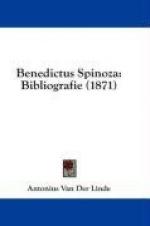|
This section contains 5,532 words (approx. 19 pages at 300 words per page) |

|
SOURCE: “From Democracy to Aristocracy: Spinoza, Reason and Politics,” in History of European Ideas, Vol. XXIII, Nos. 2-4, 1997, pp. 105-15.
In the essay that follows, Prokhovnik claims that, while Spinoza celebrates democracy in the Theologico-Political Treatise of 1670, the traditional focus on this early text fails to consider Spinoza's preference for aristocracy in the Political Treatise of 1677.
The Received View of Spinoza on Democracy
Several commentators on Spinoza take his famous pronouncements in the Theologico-Political Treatise1 of 1670, that, democracy is ‘the most natural form of government’ (TTP 263), and ‘of all forms of government the most natural, and the most consonant with individual liberty’ (TTP 207), along with his statement in the Political Treatise of 1677 that democracy is ‘the perfectly absolute dominion’ (TP 385) as the only evidence that is needed to form an assessment of Spinoza's estimation of democracy. On the strength of these pronouncements, such commentators assume that Spinoza was...
|
This section contains 5,532 words (approx. 19 pages at 300 words per page) |

|


